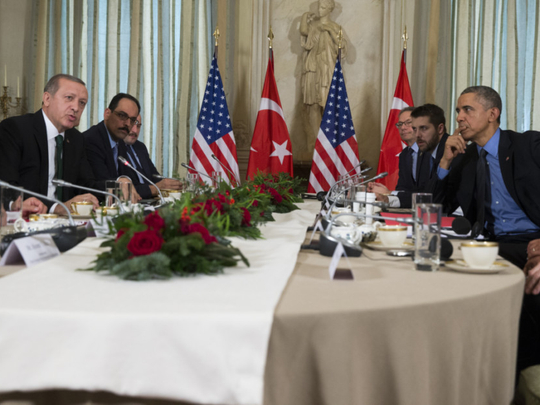
Ankara: Turkey’s downing of a Russian warplane near the Syrian border has not only frayed previously warm ties between Russia and Turkey, but has also put a strain on the peace talks for Syria, Russia’s foreign ministry spokesman said Tuesday.
Turkey shot down the Russian jet last week, insisting it violated its airspace despite numerous warnings and has said it will not apologise for the incident that killed one Russian pilot and a Russian serviceman trying to retrieve the other pilot.
Russia has claimed that Turkey shot down its plane to protect what he described as Turkish profiteering from the oil trade with Daesh and has slapped a package of sanctions against Turkish products.
Russian Foreign Ministry spokeswoman Maria Zakharova said the downing has not only caused a diplomatic rift but would also complicate peace talks for Syria that are taking place in Vienna.
Russia insists the talks cannot go ahead until all parties agree on which opposition groups should be covered by a possible cease-fire and which should be targeted by air strikes.
Zakharova said Moscow was now more determined than ever to get other parties to agree on a list of “terrorist” groups in Syria before the next round of talks. Without that, Zakharova said, joint action in Syria would not be possible.
Aiming to head off the rift, President Barack Obama, urged Turkey and Russia on Tuesday to set aside their tensions and focus on the common priority of defeating Daesh.
In a meeting with Turkish President Recep Tayyip Erdogan in Paris, Obama vouched for the Nato ally’s right to self-defence, and he pledged a solid US commitment “to Turkey’s security and its sovereignty”. Yet he emphasised the need for Turkey and Russia to “de-escalate” their conflict and not get distracted from the campaign against Daesh and efforts to resolve Syria’s civil war.
“We all have a common enemy. That is [Daesh],” Obama said. “I want to make sure that we focus on that threat.”
Turkish Prime Minister Ahmet Davutoglu yesterday accused Russia of trying to “cover up” its infringement of Turkey’s airspace with “unfounded” claims that Turkey is illegally importing oil from Daesh.
Erdogan has said he is prepared to step down if Russia can prove the oil claims and has urged Russian President Vladimir Putin to do the same if he can’t prove them.
“It is not possible to cover up the violation of the Turkish airspace with unfounded accusations against Turkey,” Davutoglu said.
Davutoglu also renewed a call for Russia to keep military and diplomatic channels for dialogue open, insisting that Russia’s stance was turning the Syria crisis into a “crisis between Russia and Turkey”.
Zakharova said Russia had intelligence about Turkey buying oil from the Daesh a while ago but preferred not to publicise it.
“We had this information before and we were working with our partners, with Turkey, with the coalition, with our Western colleagues on this matter but we didn’t do it publicly,” she said. “We tried many times to convince them to change their approach to this matter, to their relationship with various organisations.”
In the latest episode of the spat, the Russian education ministry said it would repatriate “as soon as possible” Turkish students in Russia on exchange programs. It also announced that nearly 50 Russian universities were suspending their cooperation agreements with Turkish counterparts.
Meanwhile, Saudi Arabia has issued invitations to 65 Syrian opposition figures to attend a conference in Riyadh to try to unify their positions ahead of proposed Syrian peace talks, Saudi newspapers reported yesterday.
Asharq Al Awsat and Al Hayat said no date has yet been set for the Riyadh meeting, but quoted unnamed sources as saying it could take place next week.
Asharq Al Awsat quoted Ahmad Ramadan, a member of the Syrian National Coalition (SNC) opposition group, as saying that the Saudi foreign ministry had “invited 65 figures to attend the conference in Riyadh”.
He said 20 members of the coalition, which is based outside Syria, had been invited, along with seven from the National Coordination Body, an internal opposition group.
Another 10 to 15 places were allocated to rebel leaders and 20 to 25 to independents, business leaders and religious figures, the paper quoted Ramadan as saying.












